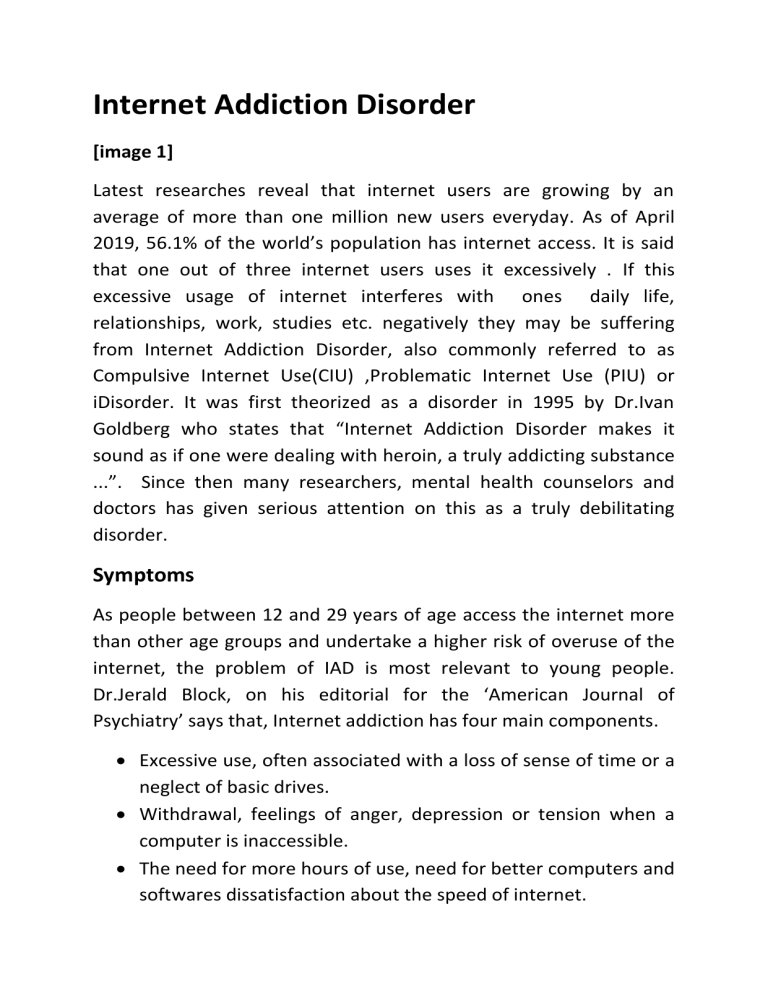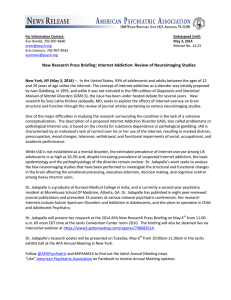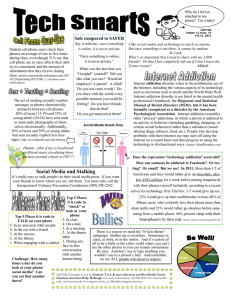Internet Addiction Disorder: Symptoms, Effects & Treatment
advertisement

Internet Addiction Disorder [image 1] Latest researches reveal that internet users are growing by an average of more than one million new users everyday. As of April 2019, 56.1% of the world’s population has internet access. It is said that one out of three internet users uses it excessively . If this excessive usage of internet interferes with ones daily life, relationships, work, studies etc. negatively they may be suffering from Internet Addiction Disorder, also commonly referred to as Compulsive Internet Use(CIU) ,Problematic Internet Use (PIU) or iDisorder. It was first theorized as a disorder in 1995 by Dr.Ivan Goldberg who states that “Internet Addiction Disorder makes it sound as if one were dealing with heroin, a truly addicting substance ...”. Since then many researchers, mental health counselors and doctors has given serious attention on this as a truly debilitating disorder. Symptoms As people between 12 and 29 years of age access the internet more than other age groups and undertake a higher risk of overuse of the internet, the problem of IAD is most relevant to young people. Dr.Jerald Block, on his editorial for the ‘American Journal of Psychiatry’ says that, Internet addiction has four main components. Excessive use, often associated with a loss of sense of time or a neglect of basic drives. Withdrawal, feelings of anger, depression or tension when a computer is inaccessible. The need for more hours of use, need for better computers and softwares dissatisfaction about the speed of internet. Negative repercussions, social isolation and trying to hide or deny the time they spend online. Physical symptoms of IAD may include back aches, headaches, neck pains, dry eyes and other vision problems, weight loss or gain due to the use of computers and devices and being isolated in one place for a long time. [image 2] Effects Internet addiction results in personal, family, academic, financial and occupational problems. Personal relationships of internet addicts may be interrupted as a result of excessive use of internet. People suffering from internet addiction spend more time alone, than with real people in their life and often viewed as socially awkward. They may create online personas which is not their real identity and pretend to be someone else online as they may be suffering from low self esteem and feeling of fear of disapproval. Diagnosis Though IAD is identified as a disorder and recently added to the ‘Diagnostic and Statistical Manual of Mental Disorders’, s standardized diagnosis has not yet been discovered. But many centers for internet de-addiction can be found around the world which are carried out as research projects to discover successful diagnosis and to treat individuals who are identified as internet addicts. Also the ‘Center for Internet Addiction’ in Pennsylvania founded by Dr.Kimberly Young in 1995 provides treatments for internet addicts and has introduced a validated measure of internet addiction to measure the use in terms of mild, moderate and several levels of addiction. Treatment The first step in treatment is the recognition of the existence of the problem. If an individual do not believe to have a problem, they are not likely to seek a treatment. Some believe internet addiction to be a ‘fad-illness’ that usually resolves itself on its own. Also it is said that IAD for some individuals may be a side effect of an underlying condition such as anxiety or depression. Studies has shown that antianxiety and anti-depressant medications has a deep affect in the amount of time spent online and suggests that Internet addiction may resolve in step with the treatments for anxiety or depression . However many researchers are uncertain of weather IAD is a disorder in its own or preferably a symptom of other underlying condition. [image 3] Conclusion With the fact that everything is online nowadays, it has revolutionized communications to the extent that it is now the most preferred medium of everyday communication. The drastical development of the internet has many pros to the world and as well as cons like IAD. By taking protective actions and with the correct use, the negative outcomes can be limited and the maximum use can be taken. Sriyanjith Herath IM/2017/030 MIT Level 1





